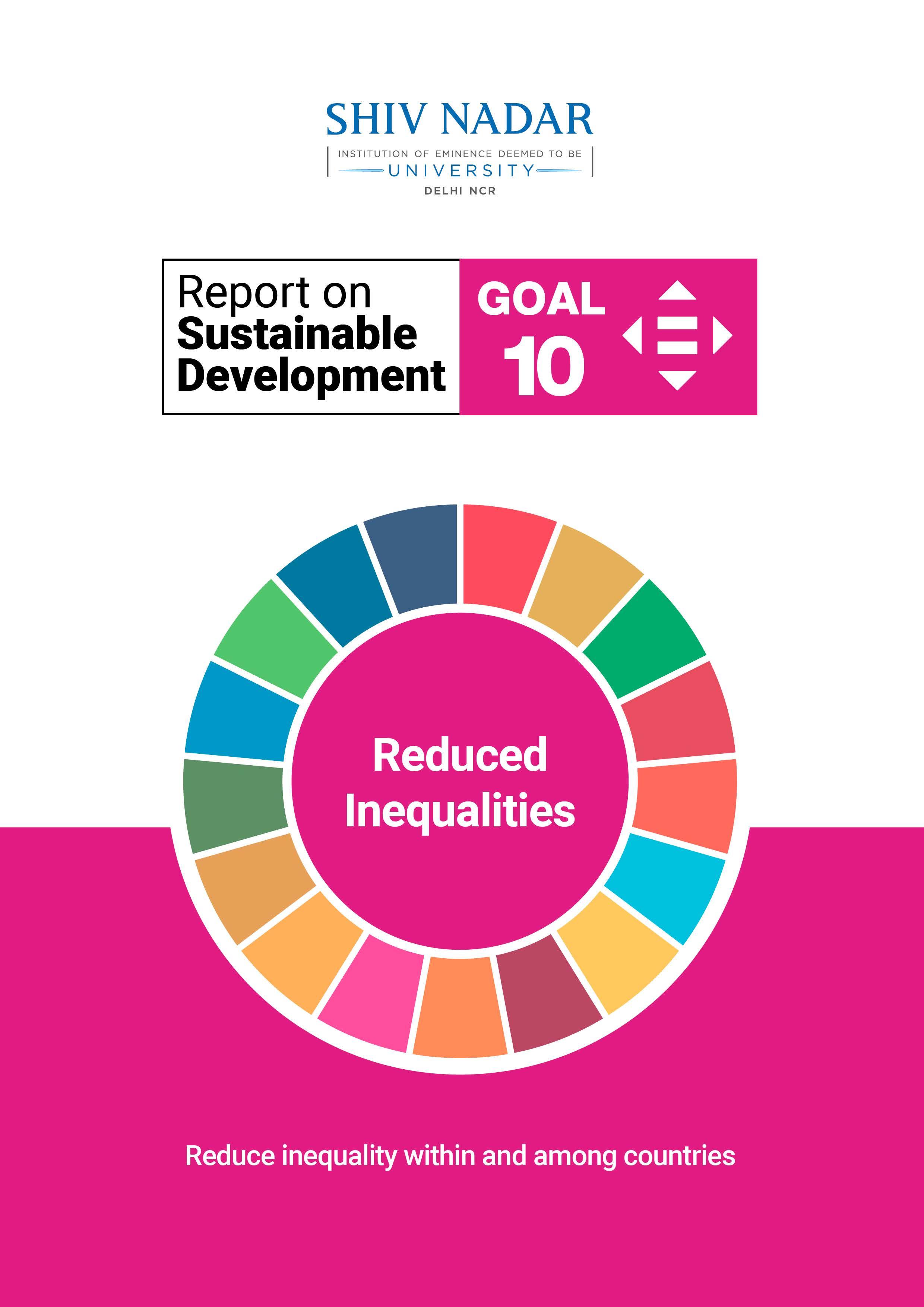


Sustainable Development Goal 10 is about reducing inequalities, ensuring opportunities, ending discrimination, and promoting universal social, economic, and political inclusion.
Universities serve as dynamic sites of critical inquiry, where inequalities are interrogated, new knowledge is constantly created, and innovative ways are formulated to address complex societal issues.
At Shiv Nadar, we organize diverse programs and partnerships to creatively engage with many aspects of SDG 10 through teaching, research, university operations, and partnerships.
Here is a glimpse of our work.
TEACHING AND LEARNING
The Departments in the School of Humanities and Social Sciences offer undergraduate and graduate courses, such as Growth and Inequality (ECO 425), Poverty and Inequality (ECO 392), Hierarchy, Difference, Inequality (SOC 120), Issues in Water Policy, Discrimination, Exclusion, and Conflicts (WSP510), Economics of Discrimination (ECO 684), Economic Development (ECO 415), Interrogating Histories and Theories of Economic Development (INT 202), Development Economics (ECO 605),
Education for Sustainable Development (SWE 313).
We offer meaningful education around sustainability and related areas to all students across the University, such as Environmental Studies (CCC 704), Environmental Impact Assessment (CCC 406), Energy for Sustainable Future (CCC 614), Green Energy Technologies (CCC 613), and many more.
Student Stories
Sociology PhD Scholar Manish Kumar receives IPN’s Small Grant
Manish is a first-year PhD candidate in the Department of Sociology at Shiv Nadar University. He has received the Indian Pastoral Network Small Grant for his research project titled “Seasonal Migration Practice of Van Gujjars: Change and Continuities.”
Manish will use the grant resources to examine and contrast the Van Gujjars’ pastoral practices in two different ecological and sociopolitical contexts: A mountain pasture, where they spend the summer, and Bijnore, a plain area that serves as their new grazing grounds.
The Indian Pastoralist Network (IPN) is a collaborative platform dedicated to advancing
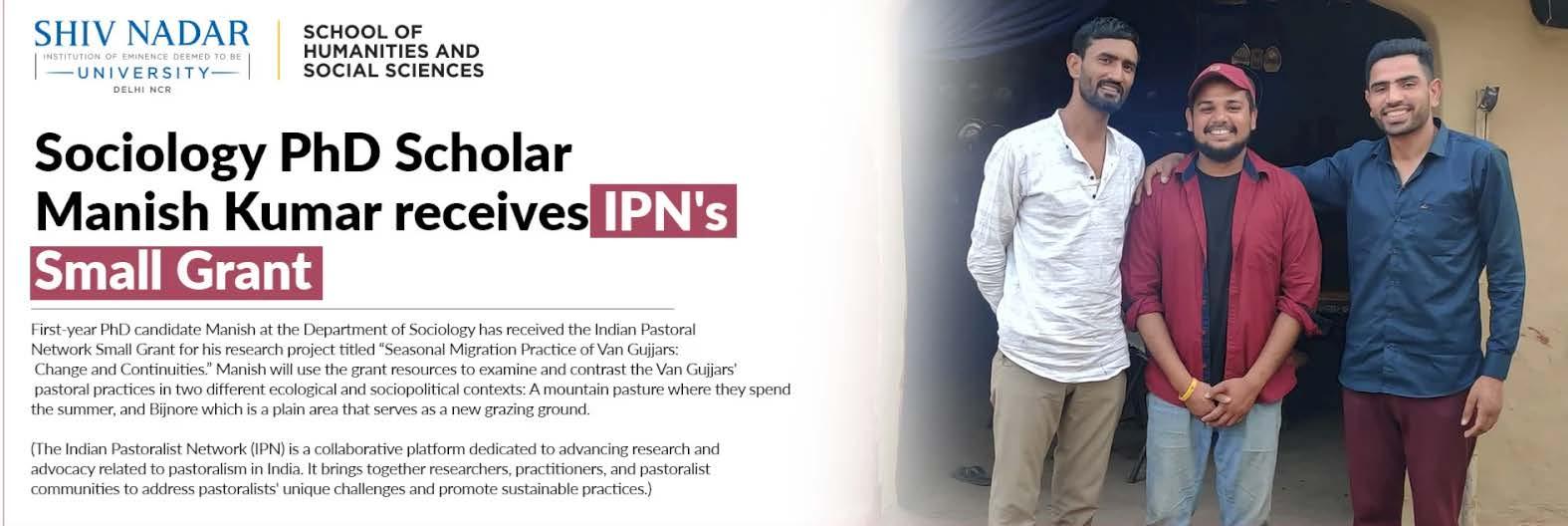
research and advocacy related to pastoralism in India. It brings together researchers, practitioners, and pastoralist communities to address pastoralists’ unique challenges and promote sustainable practices.
Carbon Markets affect marginalized communities
Adithya Santhosh Kumar, a recent alumnus, published a piece on how carbon markets affect marginalized communities and turn indigenous farming practices into corporate profit, leaving communities empty-handed.
Exemplifying the university’s interdisciplinary aspirations, Adithya recently graduated with a major in Mechanical Engineering, with a minor in International Relations, and has a keen interest in sustainability.

From Shiv Nadar University to shaping impactful global development initiatives,
Raaga’s journey exemplifies commitment and purpose
S. Raaga Akkineni is a Research Analyst at the International Finance Corporation (World Bank Group). A graduate of Shiv Nadar University, in the class of 2019, Raaga earned her bachelor’s in economics. After completing her Master’s from New
York University, Raaga is today working in the area of evaluating the impact of development initiatives in varied socio-economic settings. She shared that her academics allowed her to bring a strong statistical approach to her work, ensuring that development projects are effective and evidence-driven.
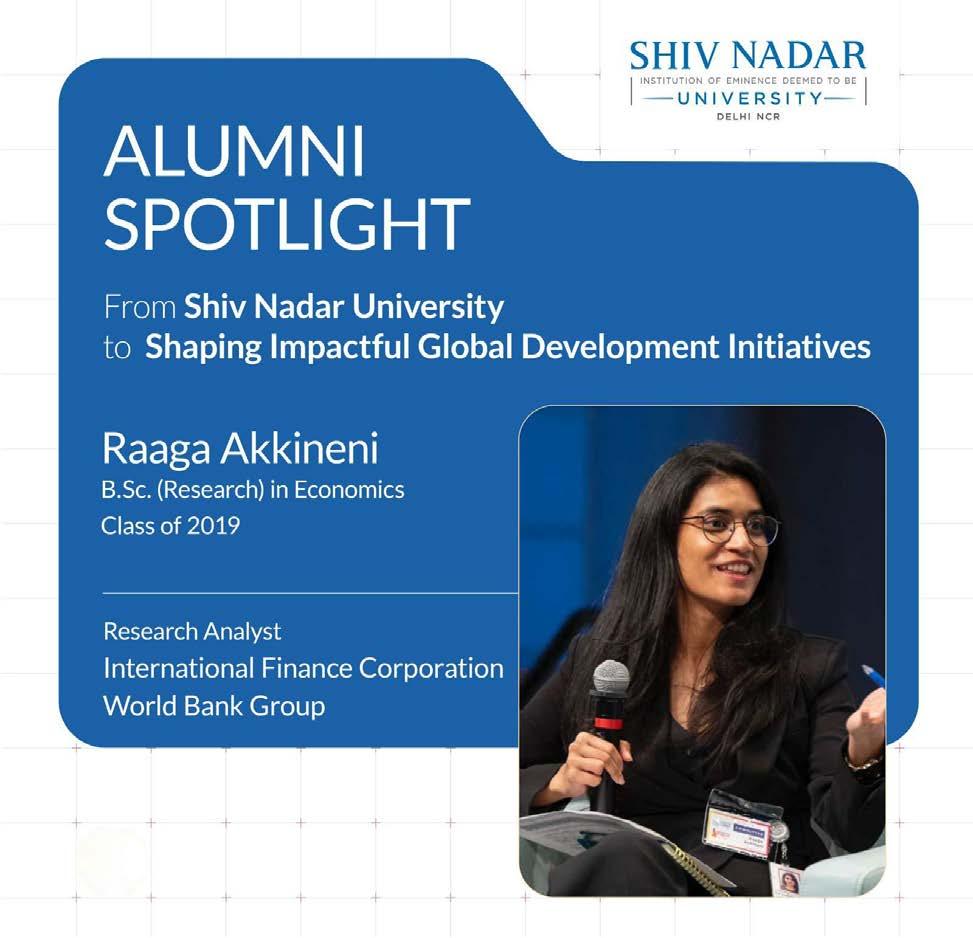


Raaga is also involved with the World Bank Group Youth Summit, where she supports young leaders and entrepreneurs in addressing global development challenges through innovative ideas and solutions.
Social Sector Internship - Student Projects
Social Sector Internship is an eight-week rigorous and mandatory internship on real-life projects that provides our undergraduate students the context, empathy, and expertise to make decisions, keeping in mind the triple bottom line involving people, planet, and profit, irrespective of the professional or entrepreneurial roles they assume in the future. These opportunities generate new forms of knowledge where disciplinary barriers are dissolved; the divides between the scholar and the practitioner, the thinker and the doer, are overcome, and concrete societal benefits accompany the academic benefits of research. SSI is contributing toward a world that is healthy, sustainable, just, and inclusive.
The students in the School of Management and Entrepreneurship undergo this rigorous 8-week on-site internship immersion in rural and non-urban ecosystems, working with the local indigenous communities to ameliorate social enterprise challenges or create growth models for the social sector.
Some examples of these projects in SDG 10 are as follows:
Mahaneeth Nadimpalli worked with Cyient Foundation on ESG, a key focus area in community participation. The project entailed evaluating various environmentally sustainable interventions for Cyient’s benefit to the community. The scope involved visiting, interacting with the local community, and measuring the project’s impact.
Navya Jain worked with HCL Tech on the project for the need analysis of slums of Gautam Buddha Nagar for CSR interventions. She extensively conducted field trips and comprehensive geographic analysis of slums in Gautam Buddha Nagar to identify areas for CSR interventions, aiming to improve living conditions, infrastructure, and access to essential services through strategic expansion and targeted support.
Ronit Ray worked on the Living Looms of India project with Access Development Services. This is a livelihood generation initiative to rejuvenate the domestic Indian Handloom Industry. LLI aims to create employment opportunities for skilled artisans in the handloom sector and train them to become capable and independent of any middlemen. It also seeks to bring the handloom industry back to its former glory by promoting handloom products made in India and produced by the local people.
Vedika Goel worked with CareNidhi on their project with a focus on social education, offering hands-on experience in Developmental sector work in the intersectionality of marginalization (disability-poverty and correlated)
Pawan Kumar worked with HCL- Samuday, which is a flagship rural development programme of HCL Foundation that intends to develop a sustainable, scalable, and replicable model – a source code for economic and social development of rural areas in partnership with state government, local communities, NGOs, knowledge institutions, and allied partners. The program is about designing and implementing optimal interventions across agriculture, education, health, environment, livelihood, and WASH (Water, Sanitation & Hygiene).
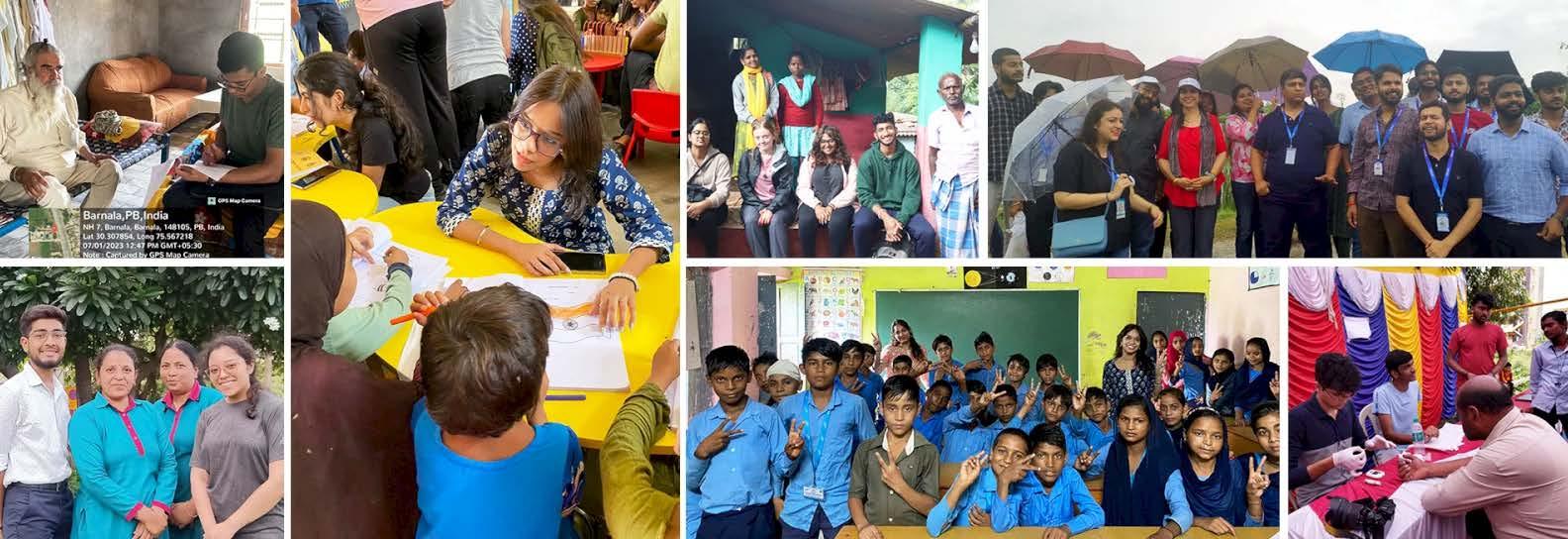
RESEARCH
Dr. Punarjit Roychowdhury, Associate Professor of Economics in the School of Humanities and Social Sciences, has been invited to serve as a Visiting Scholar at the United Nations University World Institute for Development Economics Research (UNU-WIDER) during the summer of 2025. The institute conducts cutting-edge policyrelevant research, capacity-building initiatives, and knowledge dissemination to inform decision-making on pressing global issues such as inequality, poverty, economic transformation, and climate change
Dr. Roychowdhury will examine the long-term effects of early-life exposure to counterinsurgency policy on India’s human capital and labour market outcomes. While the adverse consequences of growing up in conflict zones are well documented, much less is known about how state responses to insurgency shape individual economic trajectories.
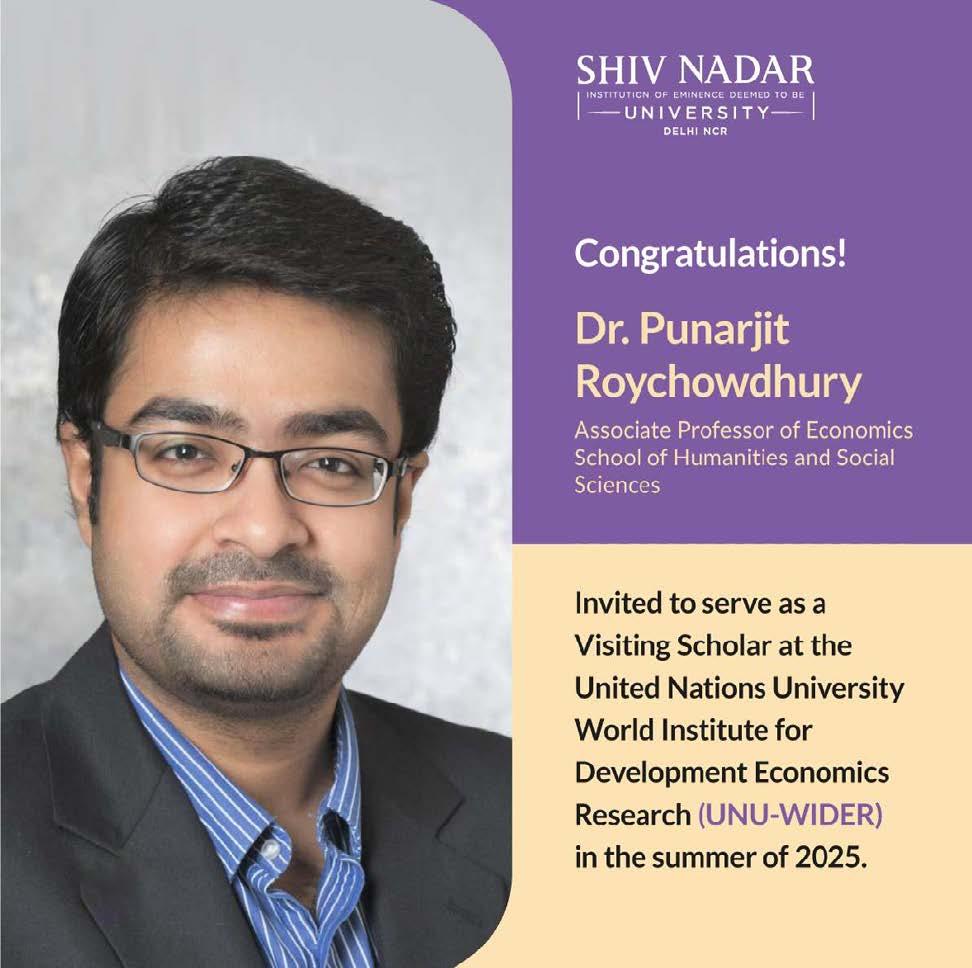
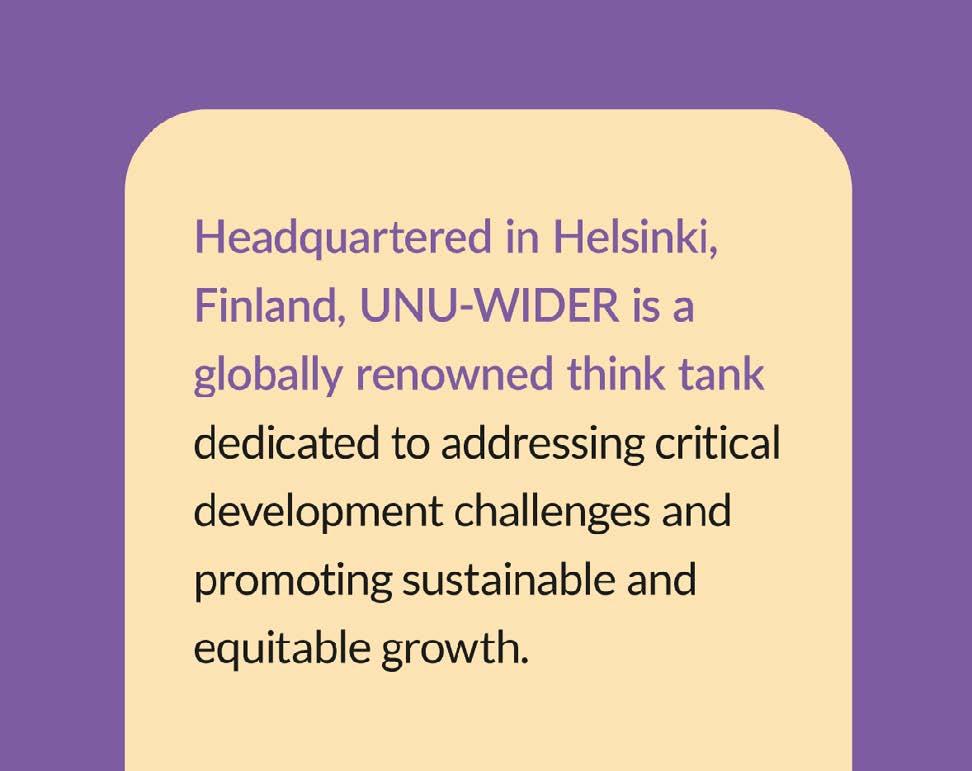
Nandwani, Bharti, and Punarjit Roychowdhury (2025). “Rural Roads infrastructure and women empowerment in India,” World Bank Economic Review https://doi.org/10.1093/wber/lhae048
Roychowdhury, Punarjit and Aanshi Sharma. “Timely justice in India: Can AI be the answer?” Hindustan Times, April 1, 2025.
Roychowdhury, Punarjit and Aanshi Sharma. “Rich getting richer, poor poorer, as growth turns capital-intensive,” 360info, March 19, 2025; Down to Earth, March 20, 2025; Northeast News, March 22, 2025; Scroll, March 23, 2025.
Dhamija, Gaurav, Punarjit Roychowdhury, and Binay Shankar (2025). “Does Urbanization Empower Women? Evidence from India,” Journal of Population Economics https://link.springer.com/ article/10.1007/ s00148-025-01085-4
Roychowdhury, Punarjit and Aanshi Sharma. “India Inc.’s profits are growing. So why are your wages still low?” The Indian Express (Digital), February 20, 2025.
Roychowdhury, Punarjit. “Can the budget unlock labour market potential?” Hindustan Times, February 4, 2025. Nandwani, Bharti, and Punarjit Roychowdhury. “Rural road infrastructure empowered women in India,” VoxDev, January 9, 2025.
Crafting Sustainability and Equitability: Reconstructing Pasts and Futures in the Indian Creative Economy
Dr. Diviani Chaudhuri, Assistant Professor, Department of English, has been awarded a threeyear International Research Grant funded by the Arts and Humanities Research Council, UK, for the project titled “Crafting Sustainability and Equitability: Reconstructing Pasts and Futures in the Indian creative economy.”
This research concentrates on an essential part of India’s creative economy: the traditional handicrafts sector. It will examine sustainability and sustainable practices related to the environment and labour in traditional handicrafts and textiles to address inequalities from an intersectional perspective and to evaluate how and to what extent traditional practices can be embedded into the creative

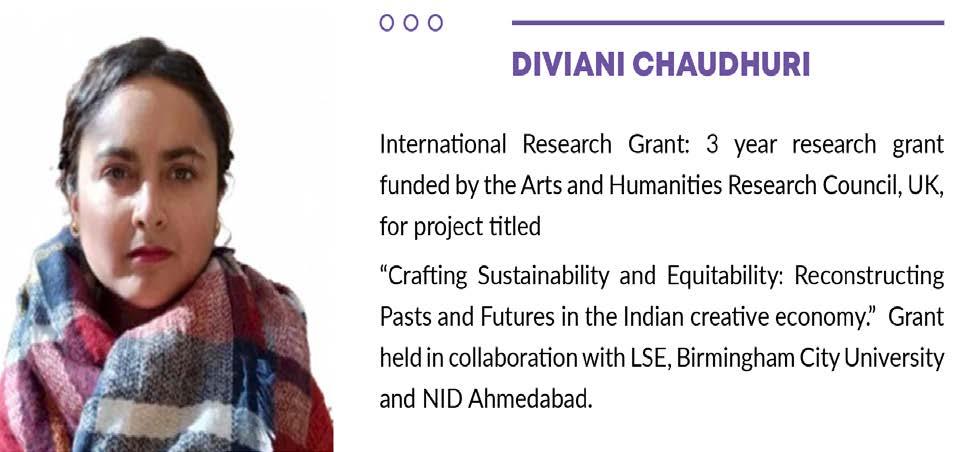
economy to ensure long-term environmentally and culturally sustainable and socially equitable development.
The project will use an ethnographically led mixed methods approach, employing interviews, surveys, and observations. It will involve a non-extractive, ethical, and reciprocal process among diverse groups, thus addressing the current and future state of the creative economy from diverse viewpoints.
The Grant is held in collaboration with the London School of Economics, Birmingham City University, and NID Ahmedabad.
Bringing Gender Justice into Urban Planning
Dr. Sandali Thakur has contributed to CREA’s Gender and WASH Curriculum. CREA is a leading feminist human rights organization based in Delhi. Dr. Thakur has designed and developed the curriculum and teaching-learning material for a comprehensive 40-hour course on Gender and WASH (Water, Sanitation, and Hygiene). This landmark course is being launched in partnership with the Odisha Urban Academy as part of an online certificate program for government officials, staff, and knowledge partners of the Housing & Urban Development Department, Government of Odisha.
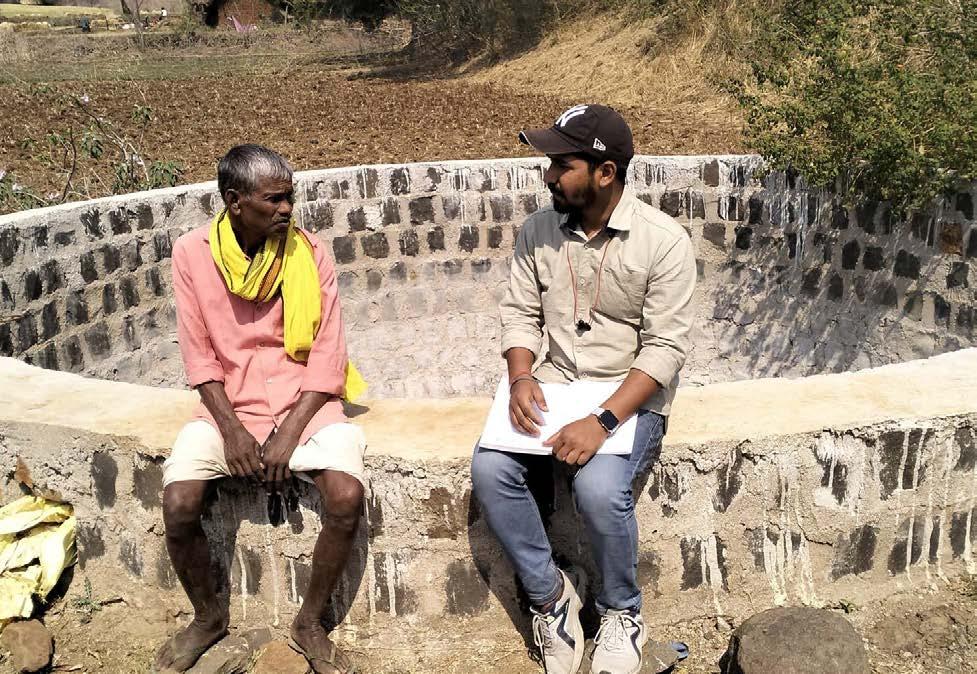

The course aims to mainstream gender perspectives into urban planning and service delivery in the WASH sector, equipping public sector professionals with conceptual tools and practical frameworks to promote inclusive, equitable, and responsive governance. Dr. Thakur’s contribution to this pioneering initiative reflects academic rigour and a deep commitment to social justice in the development sector.
on Campus
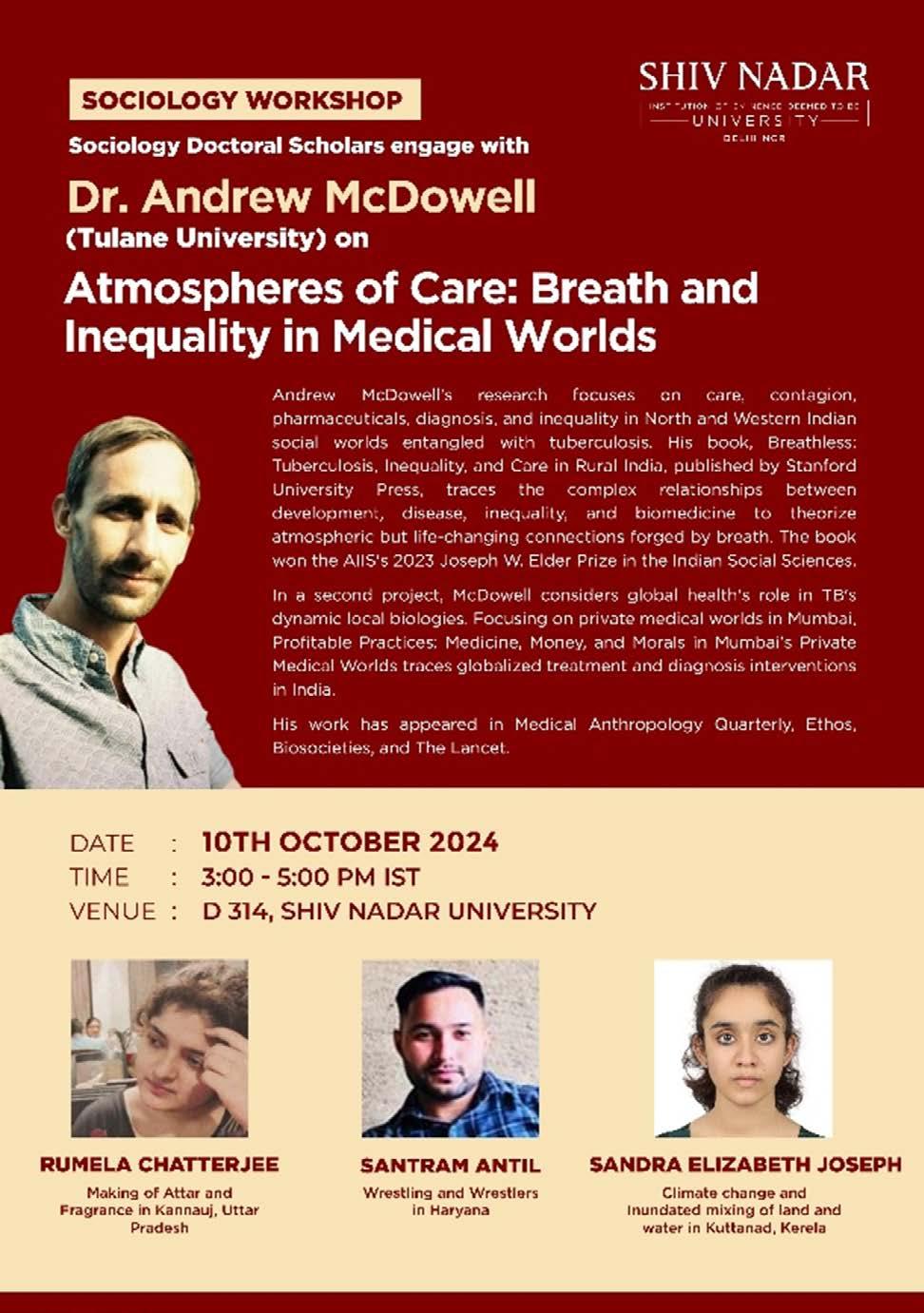
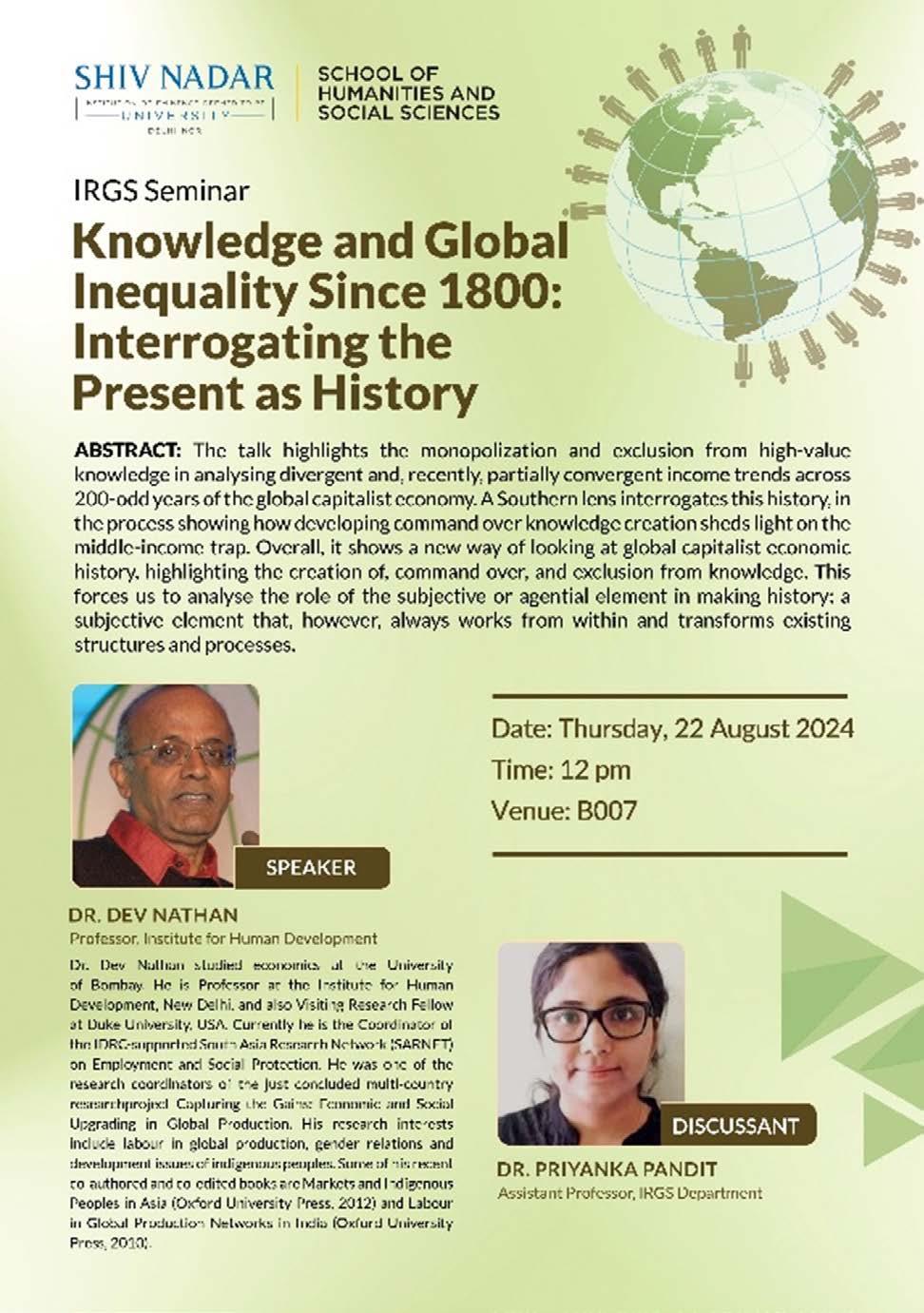
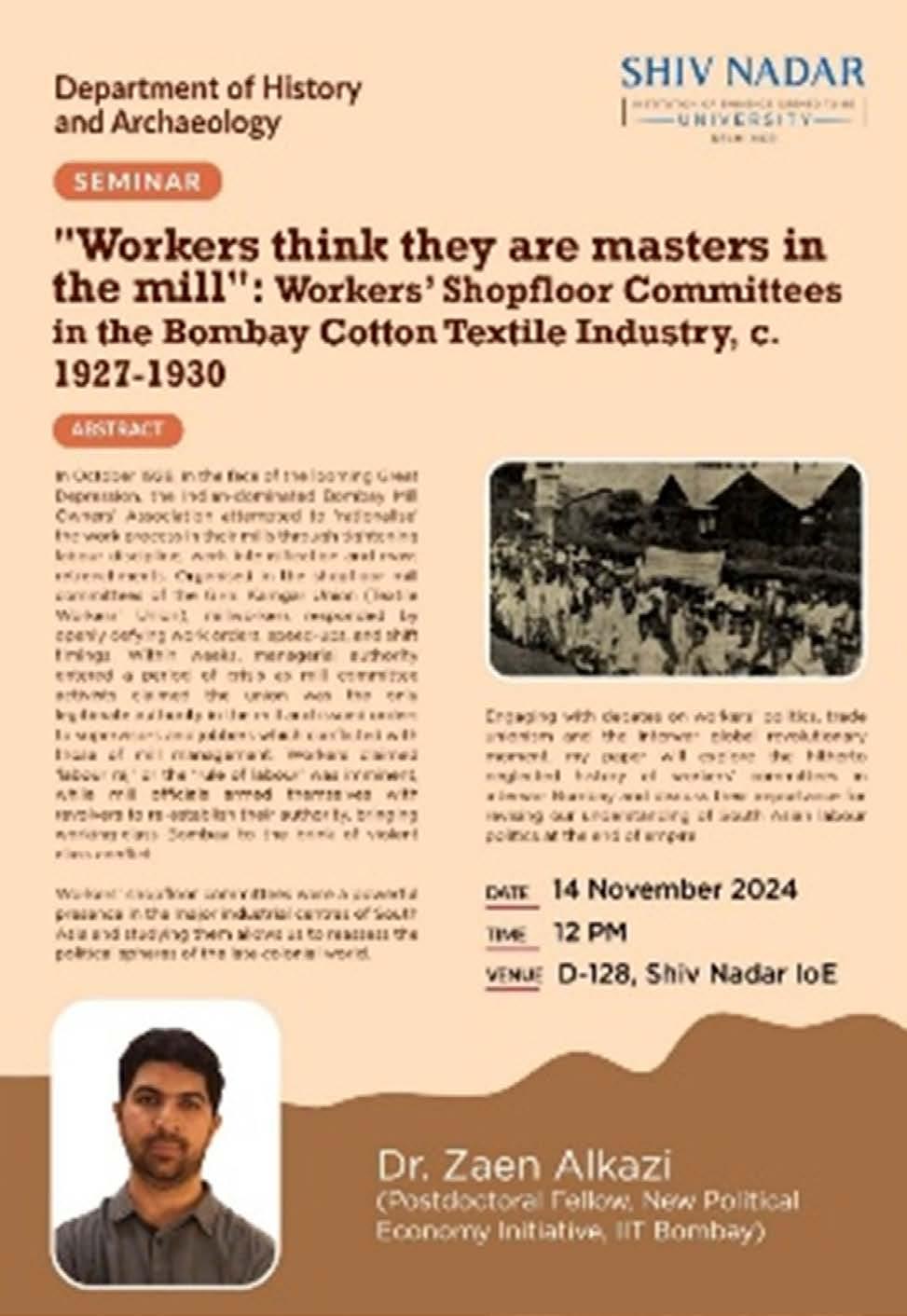
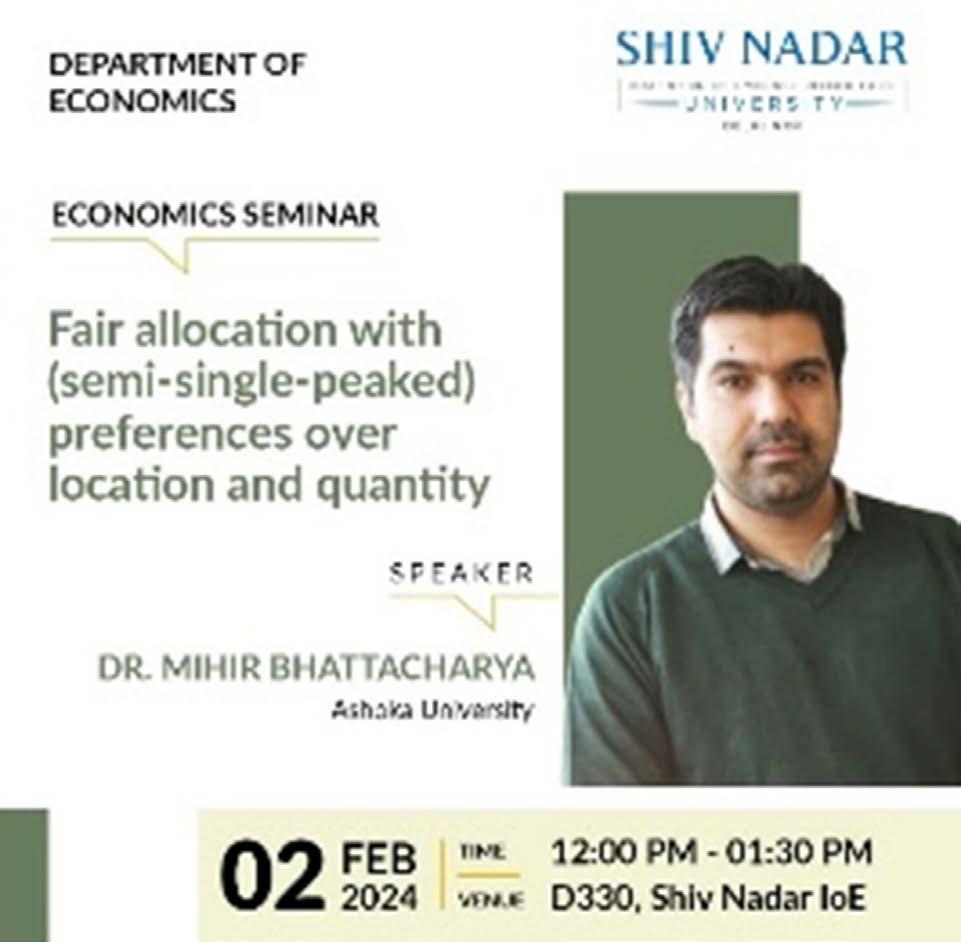
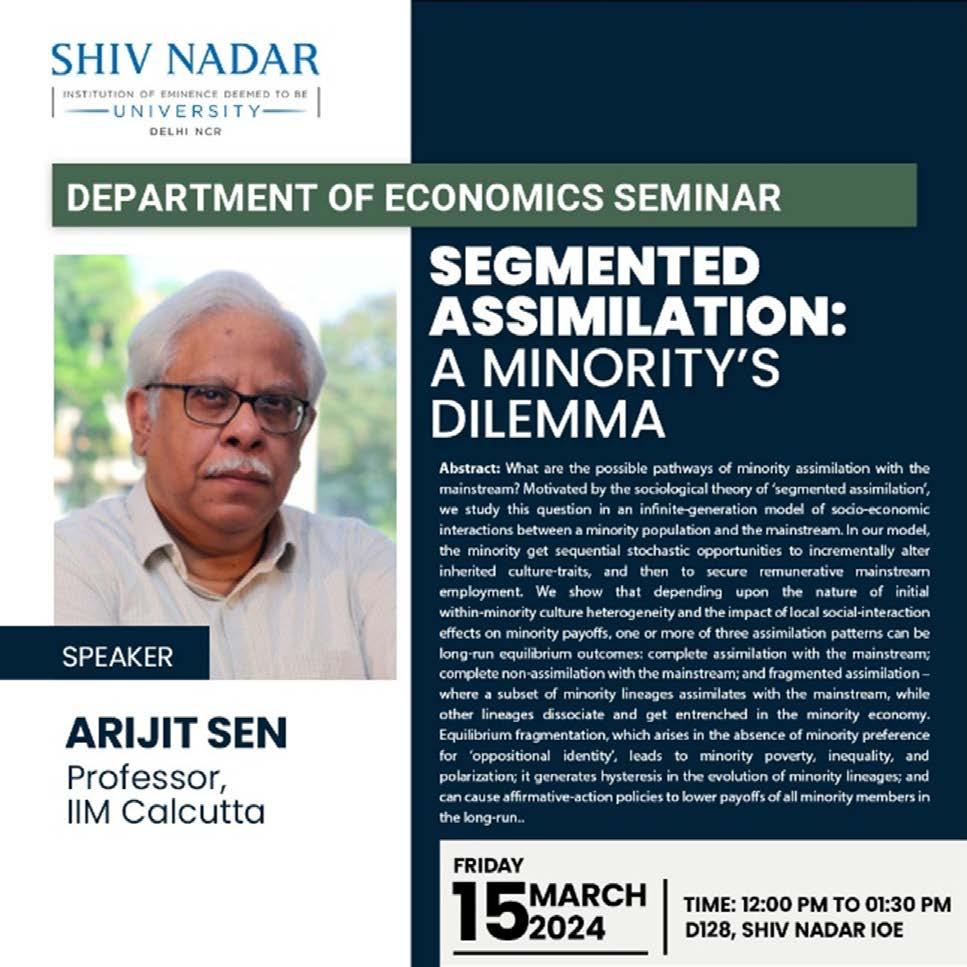
INSTITUTIONAL PRACTICES
Disability Support Cell
Shiv Nadar Institution of Eminence has constituted Disability Support Cell (ref. bod/2019-20/632, for compliance with the Honourable Supreme Court Order No.292 of 2006) for students with disabilities in the University. The objective of the cell is to make campus friendly for all students with disabilities, provide easy access to resources to the student, up to the extent possible, address problems or special needs, facilitate the academic and student life journey of a disabled student in the university, at the same time protect the confidentiality of students’ disability-related information. All students and staff

have access to the cell via the office and contact email disability.support@snu.edu.in.
Financial Aid to Deserving Candidates
The University is committed to helping deserving students so that finance is a smooth process in the educational journey of exceptional students. Based on eligibility criteria, the University offers Financial Aid and Scholarships to students selected through the specified admission criteria(s) in undergraduate programs, covering part or entire academic and living expenses.
Zero tolerance policy for gender insensitivity and sexual harassment
Shiv Nadar University is an inclusive workplace with a zero-tolerance policy for gender insensitivity and sexual harassment. We have an active Internal Complaints Committee (ICC) as per the University Grants Commission (UGC) guidelines prescribed by the law, which investigates complaints regarding sexual harassment within the University (considered as a workplace) and recommends appropriate action. At the beginning of the annual year, the ICC also undertakes sensitization programs for all incoming students, faculty, and non-teaching staff. The University also has a full-time Gender Officer who works closely with the ICC. All students and staff
have access to the gender office through the gender officer or by email at gendercommittee@snu.edu.in
Celebrating diversity
Shiv Nadar has a thriving student community, a fully residential campus with students from 28 states. The university is a microcosm of India that reflects the country’s cultural diversity, talent, and perspectives, fostering and appreciating the campus’s cultural, geographical, linguistic, and ethnic diversity. Embracing the nation’s variety and unity, the University hosts and celebrates many events and festivals to honor this diversity
Students of the Master’s in Rural Management celebrate World Indigenous Peoples’ Day
The students of the Master’s in Rural Management celebrated World Indigenous Peoples’ Day on August 22, 2024. The second batch of 45 students comprised 22 women and 23 men from 10 states and 27 districts nationwide. Of these, 17 are Adivasis, including two students from Maharashtra’s Kolam community, a particularly Vulnerable Tribal Group (PVTG).
It was heartening to see the students ideate, conceive, design, and present the event, showcasing the rich diversity of India. Celebrating the event with the huge support of university leadership is a
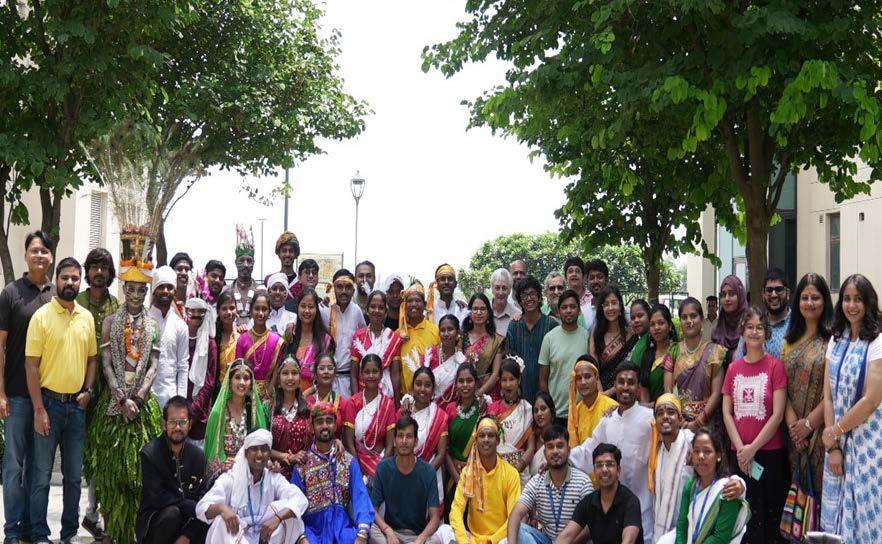
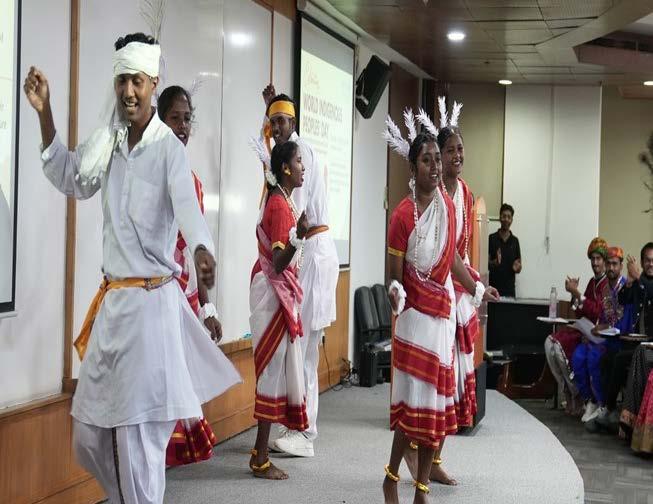
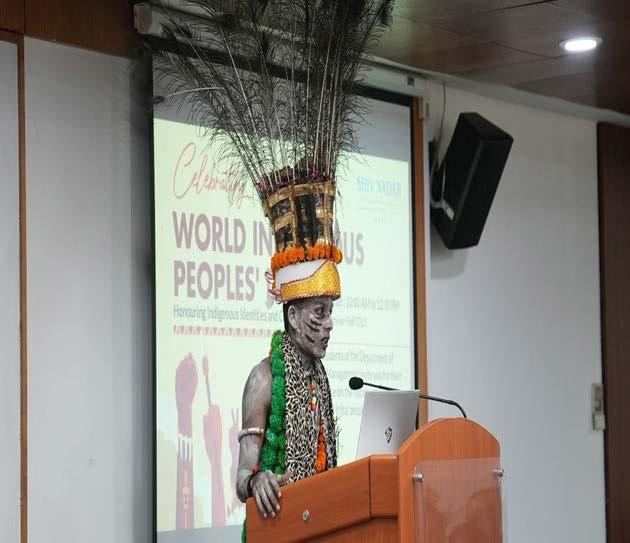
powerful marker of the university’s inclusiveness, diversity, and social commitment.
PARTNERSHIPS
Global Research Program on Inequality (GRIP)
GRIP is an interdisciplinary research program dedicated to understanding and addressing rising inequalities in all world regions. Committed to epistemological openness, methodological diversity, and the co-production of knowledge, it seeks to integrate plural traditions, various knowledge discourses, and multiple modes of research.
Dr. Yasmeen Arif, Professor, Department of Sociology, is appointed visiting researcher on the project at Bergen. Dr. Arif has worked with GRIPaffiliated senior researcher Bjørn Enge Bertelsen to address questions on identity and global intellectual labor. Her work with Elina Troscenko on another project addresses Political Protests and New Forms of Citizenship.
Dr. Arif also lectures on Governance and Inequality at the Bergen Summer Research School.
Socio-economic growth, inappropriate use of antibiotics, and the burden of drug resistance
Dr. Samit Bhattacharya, Associate Professor, Department of Mathematics, in collaboration with the Public Health Foundation of India (PHFI), Delhi, researched the socio-economic growth, inappropriate use of antibiotics, and burden of drug resistance to showcase how these three components are related through a self-reinforcing cycle. The study results prove how economic disparities (rich become richer and poor become poorer) diverge as a consequence, and the burden of drug resistance increases. The emergence of antimicrobial resistance has raised significant concerns for public health in many lower-income countries, including India. Socio-economic determinants like poverty, health expenditure, and awareness accelerate this emergence by influencing individuals’ attitudes and healthcare practices, such as self-medication. This self-medication practice is highly prevalent in many countries where antibiotics are available without prescriptions. Thus, complex dynamics of drug resistance driven by the economy, human behavior, and disease epidemiology pose a serious threat to the community.
Scholarships for undergraduate admissions to the wards of Indian Air Force personnel
Shiv Nadar University Delhi-NCR and the Indian Air Force (IAF) inked a memorandum of understanding to provide scholarships for undergraduate admissions to the wards of Indian Air Force personnel. This includes families of deceased personnel while in service, disabled individuals, physical casualties, retired personnel, and those currently serving, including those posted abroad on special missions or duties.
Under this five-year agreement, wards of IAF personnel will receive tuition fee concessions as follows: 100% (Freeship) for up to 3 wards of IAF personnel who died while on duty, up to 75% for up
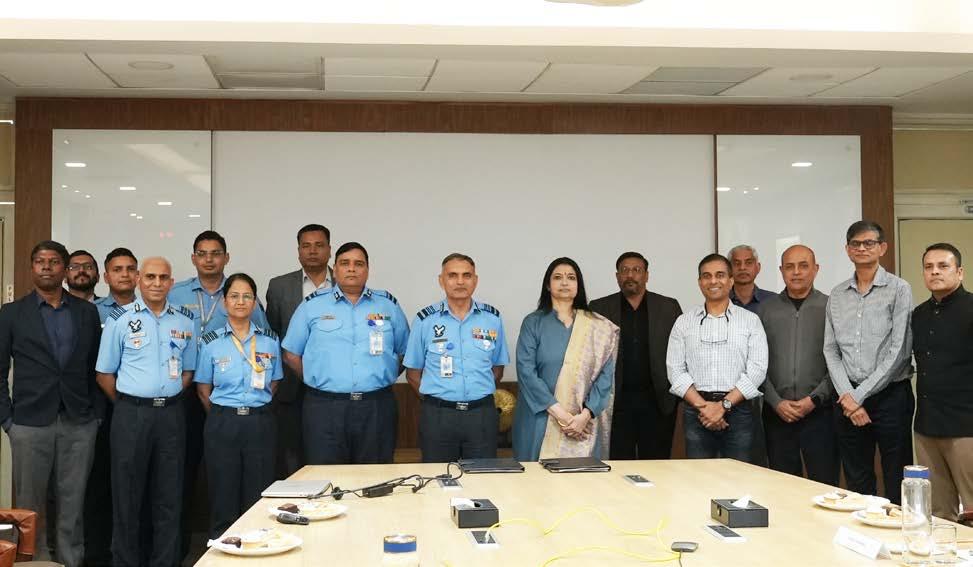

to 8 wards of serving IAF personnel, and up to 50% for up to 4 wards of retired IAF personnel.
Memorandum of Understanding (MoU) with the Indian Coast Guard and the Coast Guard Wives Welfare Association (CGWWA)
Shiv Nadar University, Delhi-NCR, has signed a Memorandum of Understanding (MoU) with the Indian Coast Guard and the Coast Guard Wives Welfare Association (CGWWA) to support the education of their wards through a scholarship program.
The MoU is very significant since it will support their efforts to provide quality education to the children of service personnel. The MoU also emphasizes the need for active collaboration and spreading awareness among the students about the career opportunities and the services offered by the Coast Guard.
has assumed a central role in the Dadri Development Project, a transformative initiative convened by the Shiv Nadar Foundation (SNF), a non-governmental organization. The project aims to create a “model sustainable rural community around Shiv Nadar University.” This commitment is shared by the university leadership, staff, and students and is instilled in the core of the University’s academic mission.
The projects include well-considered, need-based interventions with multi-stakeholder engagement,
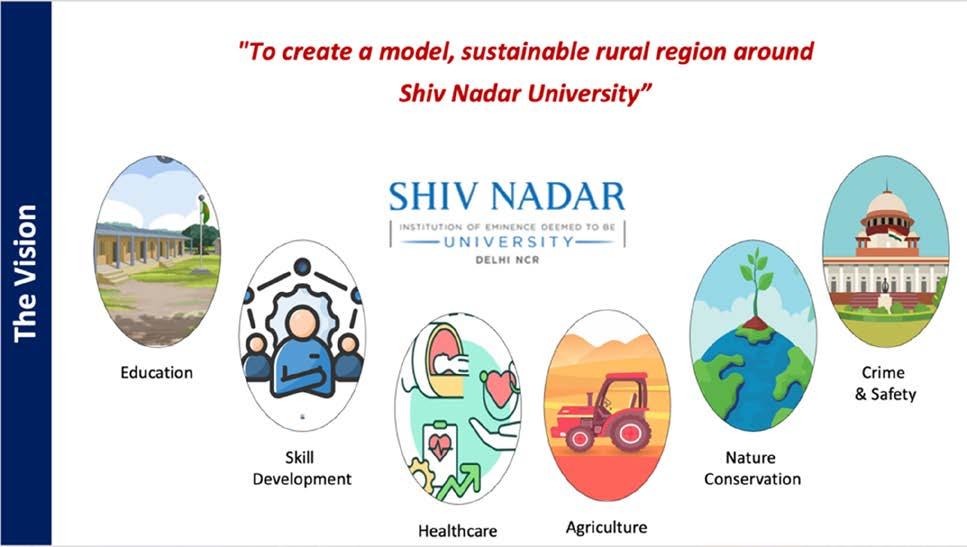
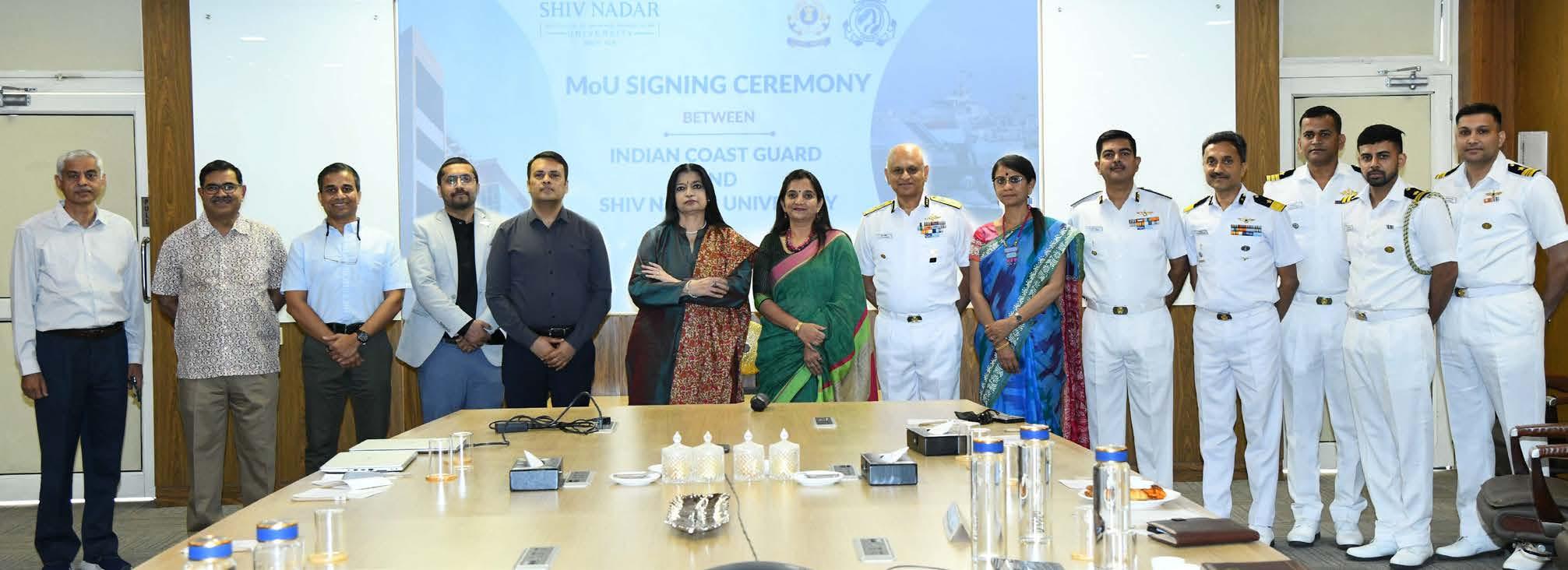
Under this MoU the wards of Coast Guard personnel will receive tuition fee concessions as follows: 100% (Freeship) for up to 2 wards of ICG personnel who died while on duty, up to 75% for up to 3 wards of serving ICG personnel, and up to 50% for up to 2 wards of retired ICG personnel.
Community Initiative through the Community Connect Program
Shiv Nadar University is located in a region called Dadri in Uttar Pradesh. Dadri is a rapidly urbanizing rural region with high socio-economic inequality and low SDG outcomes. The university is deeply committed to positively impacting the region and
implemented in phases, supported by thorough evidence, and subjected to rigorous monitoring and evaluation. These initiatives aim to uplift the local community through various programs, including skill development, healthcare awareness, and promoting sustainable practices. Here is a glimpse of some of our projects in this program. These projects focus on education, health care, skill development for employability, social safety, reduced inequalities, nature conservation, and agriculture.
Community Kitchens
As part of Shiv Nadar University’s Community Connect Program, in collaboration with ACCESS Development Services, women in neighboring
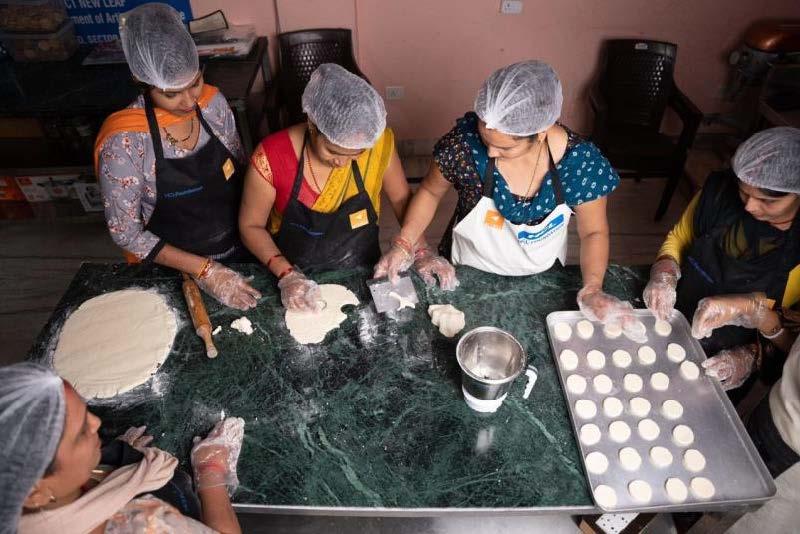
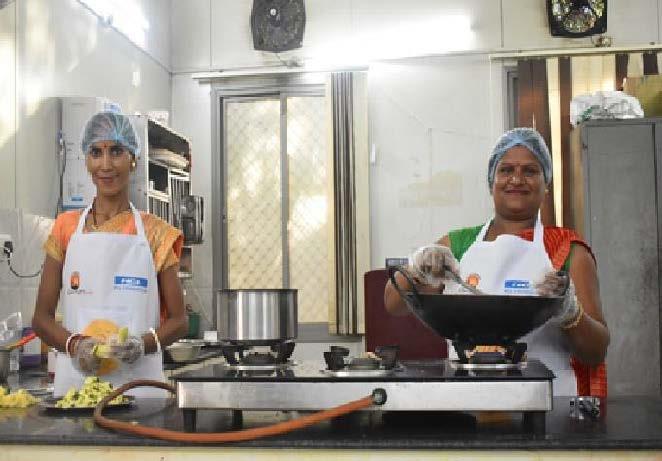
villages are trained to operate SHG-led community kitchens, equipping them with essential entrepreneurial skills. The sessions covered savings, credit linkages, budgeting, digital payments, and online food delivery platforms, enabling participants to develop practical kitchen management budget plans. This initiative fosters self-reliance and
sustainable growth by emphasizing digital and financial literacy. Through community-driven enterprises, these women are shaping a future of economic independence and grassroots impact.
Education and Skill Development
The university also runs programs to impart key life skills to children of its third-party staff and enhance their prospects for the future.
This multi-faceted program includes well-considered, need-based interventions with multi-stakeholder engagement, implemented in phases, supported by thorough evidence, and subjected to rigorous monitoring and evaluation. These projects focus on education, health care, skill development for employability, social safety, reduced inequalities, nature conservation, and agriculture.
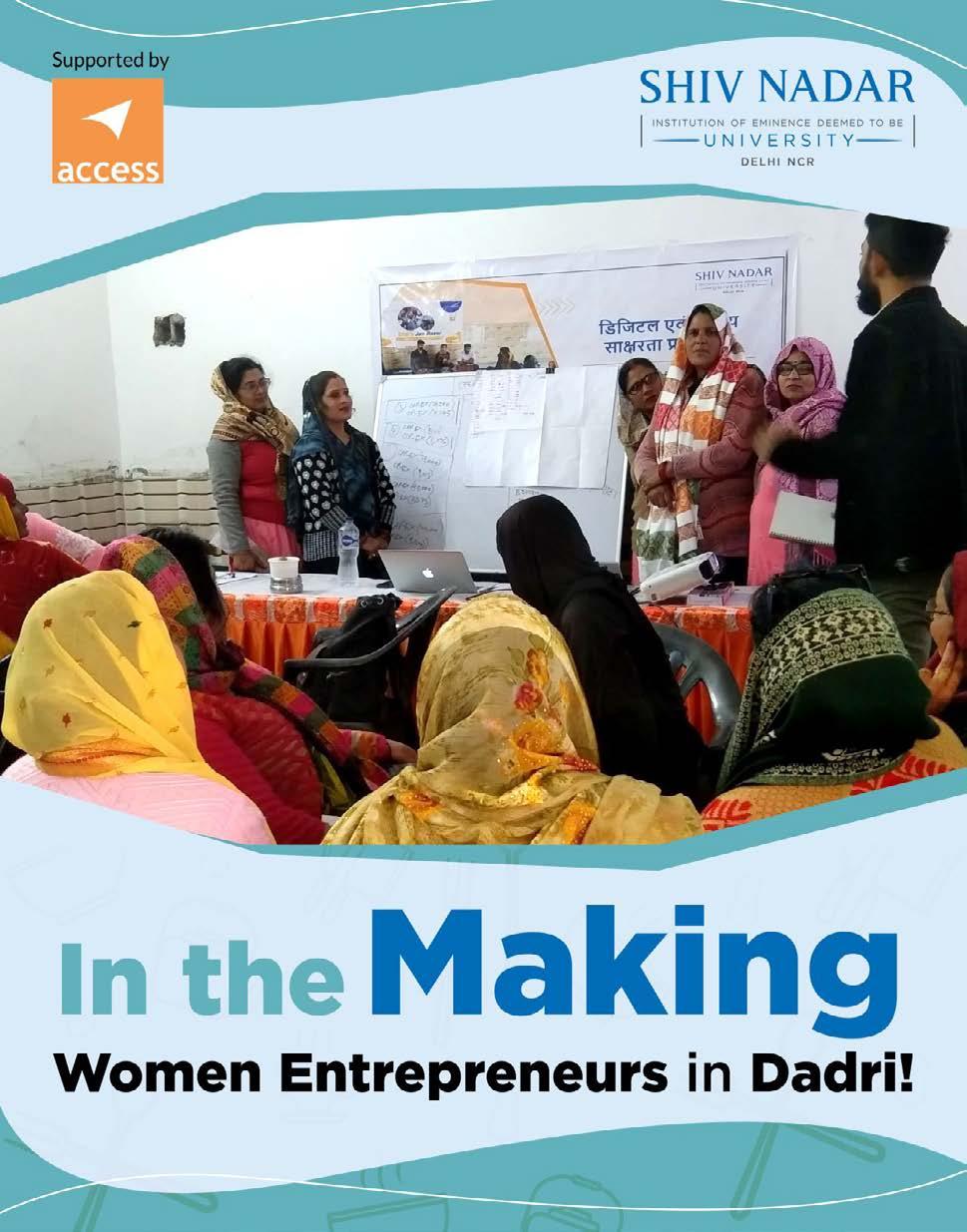

Shiv Nadar Institution of Eminence is fully committed to the UN Sustainable Development Goals (SDGs). We have embraced a four-pronged strategy for SDGs through teaching, research, our core institutional practices, and partnerships.
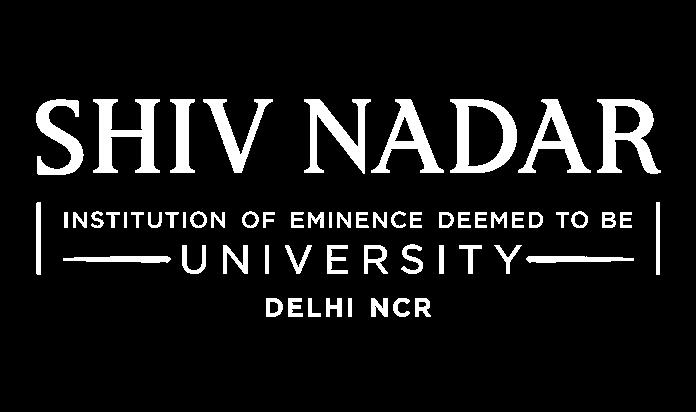
Deepa Hazrati Senior Manager, Office of the Vice-Chancellor deepa.hazrati@snu.edu.in
